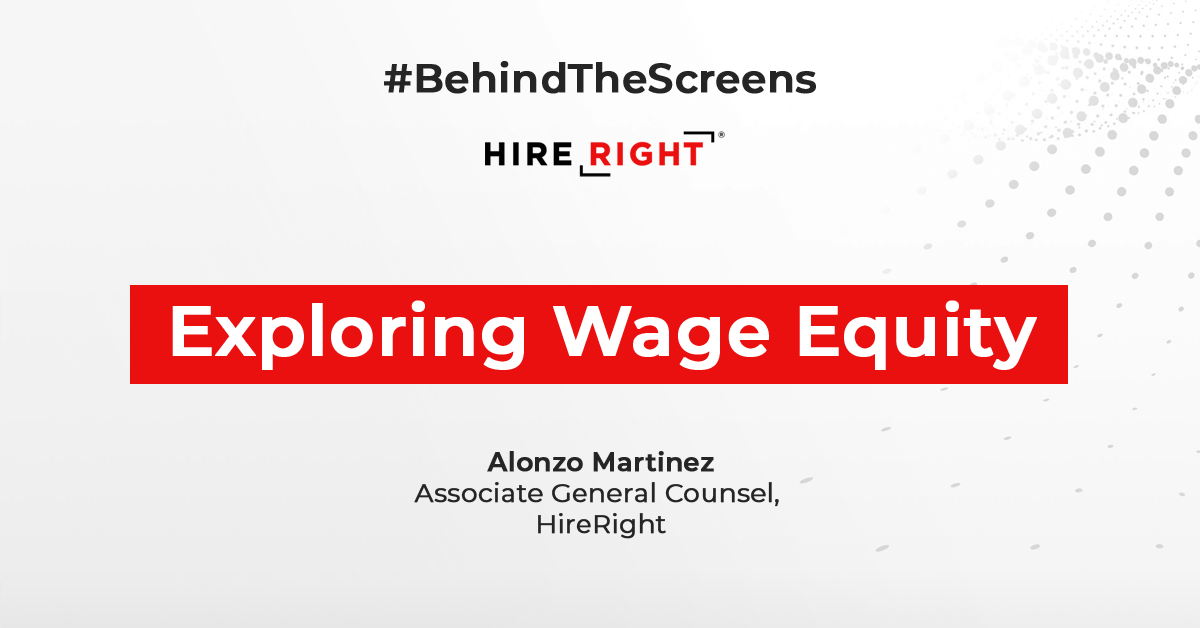#BehindTheScreens – Exploring Wage Equity
In this episode of #BehindTheScreens, we discuss wage equity, the ever-evolving legislative landscape, and how employers can promote wage equality in the workplace with Alonzo Martinez, HireRight Associate General Counsel.

Welcome to another episode of Behind the Screens, a HireRight video series shedding light on the latest in recruiting, compliance, screening and more. In this episode, host Suzanne DeBow is joined by Alonzo Martinez, Associate General Counsel at HireRight.
In this episode, Suzanne and Alonzo discuss wage equity and the public’s interest for the government to address wage inequality. As the landscape continues to evolve, employers need to be aware of changing legislation and how to promote wage equality in their own workplaces.
Key Points
Wage equity is an ongoing battle that first gained traction in the 1800s, however, there are still strides to be made.
Much of the legislation that has been passed was introduced by state and local governments.
In 2017 in advance of the country’s first salary history ban, HireRight took the position that we would no longer ask candidates to disclose their salary history nor would the company verify it as a standard practice.
Listen to the episode now or read the transcript below.
Transcript:
SUZANNE: Hello, and welcome to Behind the Screens with HireRight. I’m Suzanne DeBow.
ALONZO: I’m Alonzo Martinez, Associate General Counsel at HireRight.
SUZANNE: In this episode, we will be talking about wage equity in the workplace. What are the origins of wage equity? Can you explain what it is and how it started?
ALONZO: Wage inequity among the sexes have probably existed since day one. In the 1800’s Susan B. Anthony among others rallied for equal pay for equal work, but that concept wasn’t formally recognized in law until Congress passed the Equal Pay Act in 1963. Despite this, women still earn around 82 cents for every dollar that men earn. So, the goal of wage equity laws are to eliminate the wage gap by paying people based on their merits, experience, and skill.
SUZANNE: What should employers be aware of?
ALONZO: Well, I would say that in modern times states and cities are picking up where the federal government left off and passing legislation to address wage equity. In fact, there are 21 cities and states that have passed pay equity laws to various degrees. Some laws prohibit employers from asking candidates about their compensation history. Other laws require that employers conduct audits to identify and correct pay discrepancies. From a HireRight perspective, in 2017 in advance of the country’s first salary history ban, in NYC, we took the position that we would no longer ask candidates to disclose their salary history nor would we verify it as a standard practice. So, I like to think that we’ve played a small part in helping to advance wage equity.
SUZANNE: What is the future of wage equality? What can we expect to see and how could that impact the screening process?
ALONZO: Well, I think we're starting to see glimpses of what the future will likely bring in terms of pay transparency laws. A few years ago, Colorado led the charge by passing a law that requires employers to include a minimum and maximum pay scale within job postings. Since then New York City has joined in. And there’s a viral trend to #shareyoursalary where workers share the details of their current and former salaries with job seekers online. So, I think we’re going to see far more pay transparency in the future, and that transparency should help to keep employers accountable and get candidates paid in a more equitable fashion.
SUZANNE: Thank you Alonzo for your contribution to our Behind the Screens series! We will see you all next time
Release Date: November 16, 2022

HireRight
HireRight is a leading provider of on-demand employment background checks, drug and health screening, and electronic Form I-9 and E-Verify solutions that help employers automate, manage and control background screening and related programs.